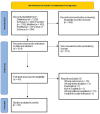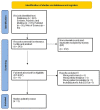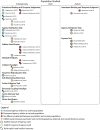Agency in schizophrenia and autism: a systematic review
- PMID: 38187412
- PMCID: PMC10768057
- DOI: 10.3389/fpsyg.2023.1280622
Agency in schizophrenia and autism: a systematic review
Abstract
Introduction: Previous research suggests that altered experiences of agency are an underlying vulnerability in both schizophrenia and autism. Here, we explore agency as a potential transdiagnostic factor by conducting a systematic review of existing literature investigating agency in autism and schizophrenia individually and together.
Methods: Following the Preferred Reporting Items for Systematic Reviews and Meta-Analyses (PRISMA) guidelines, we conducted three systematic searches on PsycINFO, Embase, Medline, PubMed and Web of Science to identify studies that investigated (1) agency in schizophrenia, (2) agency in autism, and (3) agency in both schizophrenia and autism.
Results: A total of 31 articles met eligibility criteria for inclusion and data extraction, with 24 measuring agency in schizophrenia, 7 investigating agency in autism, and no articles comparing the two. Results show that, compared to control populations, agency is significantly different in every identified schizophrenia study and generally not significantly different in autism.
Discussion: Importantly, we identified a lack of studies using common tasks and a disproportionate number of studies investigating different dimensions of agency across the two conditions, resulting in limited grounds for valid comparison.
Systematic review registration: Prospero, CRD42021273373.
Keywords: autism; judgment of agency; schizophrenia; sense of agency; transdiagnostic.
Copyright © 2023 Tan, Carter, Marshall and Perrykkad.
Conflict of interest statement
The authors declare that the research was conducted in the absence of any commercial or financial relationships that could be construed as a potential conflict of interest.
Figures



References
-
- American Psychiatric Association . (1952). DSM-I diagnostic and statistical manual: Mental disorders (1 ed.). Washington D.C.: American Psychiatric Association.
-
- American Psychiatric Association . (1968). DSM-II diagnostic and statistical manual of mental disorders (2nd). Washington D.C.: American Psychiatric Association.
-
- American Psychiatric Association . (1981). DSM-III: Diagnostic and statistical manual of mental disorders. Washington: APA.
-
- Balconi M. (2010). “Neuropsychology of the sense of agency: from consciousness to action” in Neuropsychology of the sense of agency: From consciousness to action (Springer-Verlag Publishing; ).
Publication types
LinkOut - more resources
Full Text Sources
Miscellaneous

